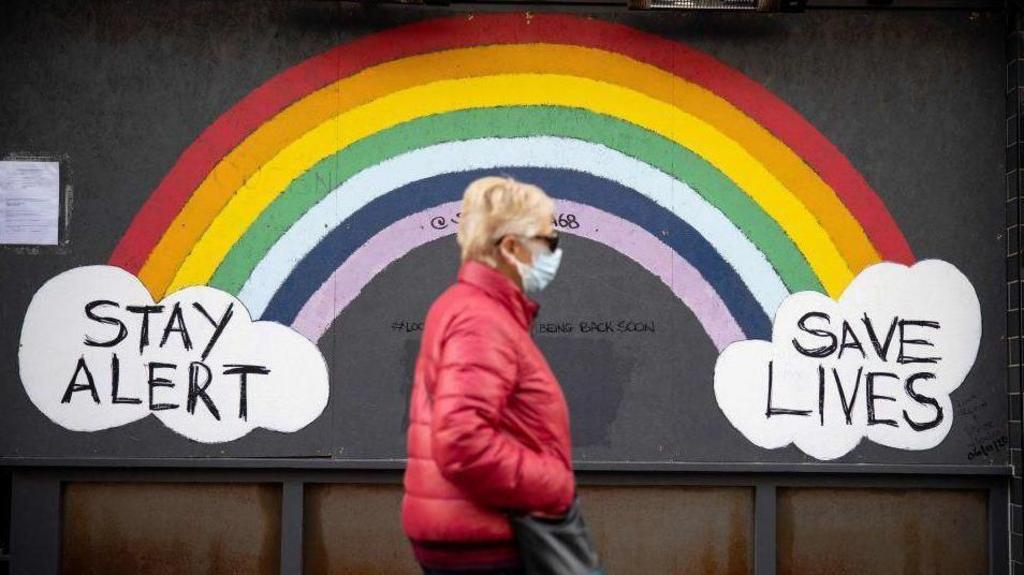The highly anticipated independent report examining the government’s handling of the Covid-19 pandemic has been released.
Baroness Hallett, the former judge who chaired the inquiry, summarised the UK’s response as “too little, too late.”
The report assesses the timeliness and appropriateness of lockdowns, as well as the impact of rule breaches within government on public trust.
Key findings from the report are presented below.
According to the report, a lockdown might have been averted had measures like social distancing and the isolation of symptomatic individuals and their households been implemented earlier than mid-March 2020.
However, the report concludes that by the time ministers acted, a lockdown was unavoidable.
The inquiry determined that by the end of January 2020, it “should have been clear that the virus posed a serious and immediate threat,” while February 2020 was “a lost month,” and the government’s overall lack of urgency was “inexcusable.”
Voluntary measures were introduced on March 16, 2020, followed by a full stay-at-home lockdown seven days later.
Modeling suggests that implementing the lockdown a week earlier, on March 16, would have resulted in 23,000 fewer deaths in England during the first wave, equating to a 48% reduction in first-wave mortality.
However, the report refrains from suggesting that an earlier lockdown would have reduced the overall pandemic death toll – 227,000 in the UK by the time it was declared over in 2023.
Such a determination is deemed too complex, contingent on various other factors that could have either mitigated or amplified mortality as the pandemic evolved.
The report characterizes the culture at the heart of the UK government during the pandemic response as “toxic and chaotic,” asserting that it negatively impacted the quality of advice and decision-making.
While acknowledging instances of poor conduct among several senior leaders and advisors, it identifies Dominic Cummings, Boris Johnson’s chief advisor, as a “destabilising influence.”
The report asserts that his actions “significantly” contributed to a culture of fear, suspicion, and distrust at 10 Downing Street.
The then-Prime Minister Johnson is also criticised for excessive optimism and “oscillation” on key lockdown decisions in the face of the looming pandemic.
The report states that Johnson “should have appreciated sooner that this was an emergency that required prime ministerial leadership to inject urgency into the response.”
Instead, it concludes that he failed to appreciate the urgency “due to his optimism it would amount to nothing.”
Meanwhile, Health Secretary Matt Hancock is accused by Baroness Hallett of lacking “candidness” regarding the UK’s preparedness to manage the virus.
It acknowledges that while the lockdowns of 2020 and 2021 undoubtedly saved lives, they also “left lasting scars on society and the economy, brought ordinary childhood to a halt, delayed the diagnosis and treatment of other health issues and exacerbated societal inequalities.”
The report finds that children were not sufficiently prioritised, and ministers failed to adequately consider the consequences of school closures.
It states that the vast majority of children were not at risk of serious direct harm from Covid “but suffered greatly from the closure of schools and requirement to stay at home.”
The inquiry adds that none of the UK’s four nations were adequately prepared for the sudden and enormous task of educating most children in their homes.
The report concludes that rule-breaking by politicians and advisors undermined public confidence in decision-making, significantly increasing the likelihood of non-compliance with implemented measures.
It lists incidents such as Cummings’ trip to Durham and Barnard Castle in March 2020; two visits to a second home during lockdown by Scotland’s chief medical officer, Dr. Catherine Calderwood; and visits to the home of scientific advisor Prof. Neil Ferguson by a woman with whom he was in a relationship during lockdown.
The report notes a “public outcry” when details of parties and social events in Downing Street emerged in November 2021.
Johnson and Rishi Sunak subsequently received fixed penalty notices for their actions.
All four nations faced criticism regarding their planning and decision-making, with the inquiry attributing hampered progress to a lack of trust between Boris Johnson and the First Ministers.
The inquiry determined that at the beginning of 2020, while all four nations exhibited a lack of urgency; the devolved administrations relied disproportionately on the UK government for leadership.
The four nations then diverged in their strategies for exiting the first national lockdown, with Scotland, Wales and Northern Ireland adopting a more cautious approach – but this was undermined by having no restrictions on travel from England, where many restrictions had been eased.
The report finds that in Autumn 2020, Holyrood was the only government to learn lessons from the first lockdown, and introduced tough, locally-targeted measures which helped avoid the need for a nationwide lockdown.
On the other hand, decision-making in Northern Ireland was described as “chaotic”, while the Welsh government’s approach is found to have resulted in the highest age-standardised mortality rate of the four nations between August and December 2020.
The report issues a comprehensive list of recommendations, including:
The government is not obligated to adopt the inquiry’s recommendations, but it is required to respond to them, potentially influencing future policies.
The inquiry has already reported back on Britain’s preparedness for the pandemic, concluding that the UK failed citizens with flawed plans.
An inquiry criticises the former first minister for making decisions within a small group of ministers and advisers in response to the pandemic.
The Covid inquiry is set to deliver its judgement on how Wales responded to the pandemic.
The inquiry into the government’s handling of the pandemic has heard from politicians, civil servants, experts and bereaved families.
The Covid inquiry is set to publish its second set of findings looking in detail at the huge political decisions that had to be made in 2020.
Former Labour MP for Dewsbury, Shahid Malik, is on trial at Bradford Crown Court with four others.

